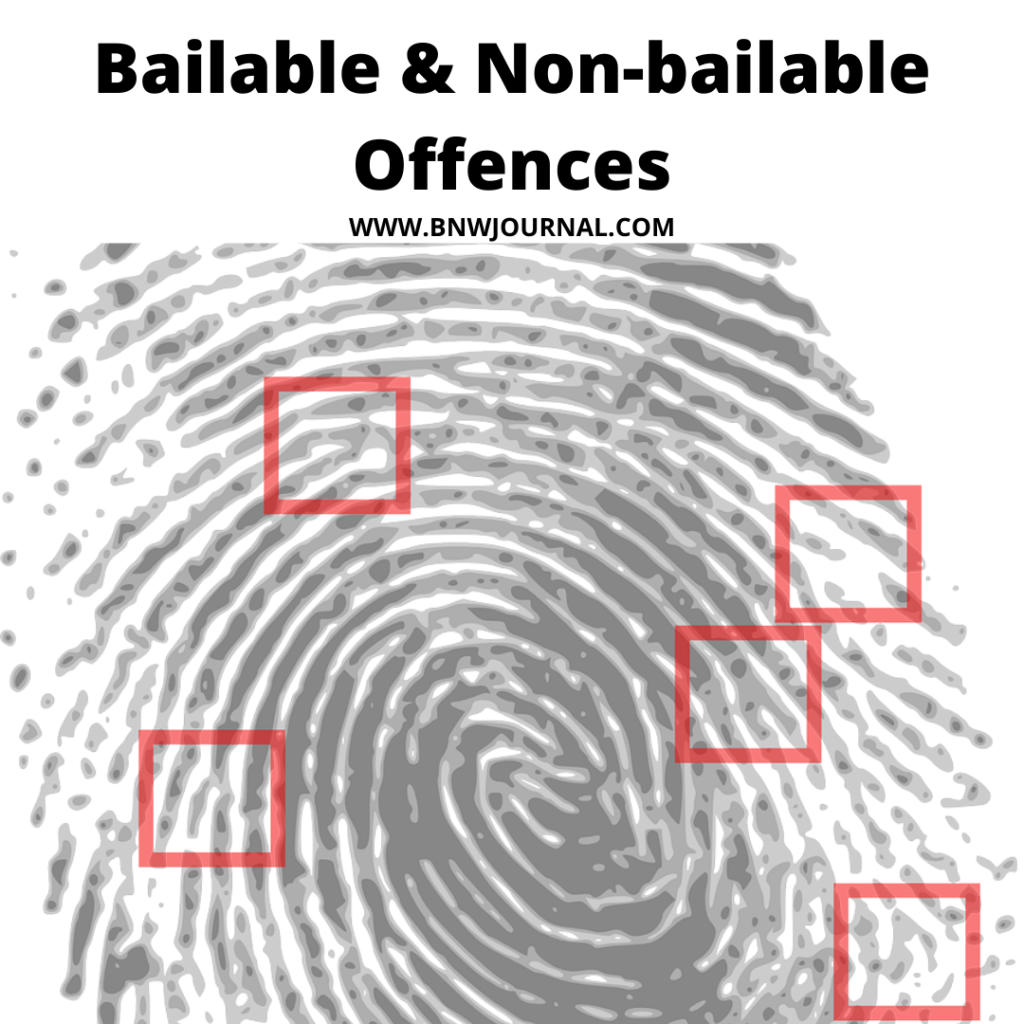![]()
Introduction
The Indian Criminal Justice System consists of two major Acts to deal with the cases related to crime. These are Indian Penal Code, 1860(hereinafter referred as IPC) and Code of Criminal Procedure, 1973(hereinafter referred as CrPC). The former comprises of the punishment for each specific offence while the latter lays down the procedure for the same. CrPC includes and talks about two types of offences: bailable and non-bailable.

Judicial Trend
A lot many changes occurred from the time of independence in the procedure of granting of bail in the judicial system. In State of Rajasthan v Balchand[1], the defendant was held guilty by the court. On appeal to the High Court, he was acquitted. The state filed a Special Leave Petition under Article 136 of the Indian Constitution. Court asked the defendant to surrender himself to the police. Because of this, he applied for bail.
Justice Krishna Iyer, then, for the first time raised his voice for the unfair bail administration process prevailing in the country. Though he mentioned that the bail administration is having its link from the traditional and ancient time; but, it is not necessary to bring that practices in the changing society. Time for rethinking and amending the procedure has arrived. It will be like that in some cases undertaking(today referred to as surety) will serve the purpose.
Bailable Offence
Section 2(a) of CrPC defines ‘bailable offence’ as “those offences which are depicted as bailable in the First Schedule; or which is said to be bailable in any other act for the time being in force.”[2] In simple terms, it means that the offence which is not heinous and no decree of court is needed for granting bail in such an offence is termed as bailable one. The first schedule of CrPC is bifurcated in two parts; the first part includes offences under IPC while the other part includes offences under other laws prevailing in the State. As per the First Schedule, major offences include the punishment of imprisonment of less than three years or fine; or both for the bailable offence. Limited number of offences have the punishment of imprisonment up to seven years or fine or both; which is mainly given under the State Amendments.
Right of Bail
As per Section 50 of CrPC, if a person is arrested by a police officer without a warrant, the officer must communicate every detail regarding his arrest. The provision of information relayed to a relative/close person of the person who got arrested.
It is also given that if the person arrested isn’t accused of a non-bailable offence, has the right to release on bail; and he may arrange sureties for the same.
Likewise, Section 436 of CrPC states that if a person gets arrested for a bailable offence without a warrant, then as an inherent right, he should be granted bail. Provided that it is on the discretion of the court or the officer to fix the bail amount, as the case may be.
In Rasik Lal v. Kishore[3], Supreme Court said that the person who is arrested for a bailable offence has an absolute right to claim bail unless the contrary is proved and if the accused is ready then it will be mandatory for the court and police to release him.
Procedure for Bail
To apply for bail, the accused or the person on his behalf has to fill a form i.e., Form No. 45, given in the Second Schedule of CrPC, and, the court will grant bail to him.
Non-Bailable Offence
As Section 2(a) of CrPC defines ‘Bailable Offence’, it also defines ‘Non-Bailable Offence’; It reads, “the offences which do not come under the per-view of Bailable one”. In general terms, offences which are heinous in nature and decree of the court is needed for bail, states as Non-Bailable Offence. The First Schedule also includes punishment of imprisonment up to life or fine or both for non-bailable offence.
Right of Bail
In non-bailable offences, the right of bail to the accused person is given under Section 437 of CrPC. The section states that if, after the person is brought before the court, the court is convinced the person should be released on bail ,then he should be released; bypassing the order of granting bail after taking the precautions stated in the same section.
It is also stated that if the person is accused of committing an offence punishable with death or life imprisonment, then he should not be released on bail. But, if a situation arises that the said offence is being committed by a person under sixteen years of age or is a woman or infirm, the court can release on bail.
In an alleged situation where a person is accused with conspiracy or attempt of an offence; which is regarding the State or property of the state; or harming of any human body; or property of an individual; may be granted bail. But conditions can be imposed on the said person regarding travelling to another state or country. And to be present whenever needed or ordered by the court by executing the sureties or bond.
The above reason will only be entertained if the accused person has not done the same nature of offence before or in the near future.
When the case is triable under Magistrate, the person whose case cannot be concluded within sixty days; then right of that person to be released on bail can be enforced. The only reason on which the said bail can be granted is when, the person was in the custody of police for the said period. By any chance, if the bail is not given by the court, then the same reason has to be put in writing by the Magistrate in-charge. Further, if the bail is ordered by the court to the accused, the reason for the same has to be recorded in writing by the Magistrate.
Procedure for Bail
For grant of bail in non-bailable offence, one has to apply to the court. In case, the court get convinced with reason for grant of bail, it will issue an order for the same after hearing the arguments. As it is mentioned, the surety of bail bond must be duly given and signed by the surety, the person accused and to be submitted by the advocate. In the case with the accused is present in the court of law, then bail is granted there itself; or if he is in the jail, the said order must be issued to the concerned jail authority; and he should be released thereof.[4]
To be released on bail in bailable or non-bailable offences, bail bond has to filed by the surety. Bail bond will be filed by the person who is acting as surety; giving assent for the appearance of the accused as and when required by the court or investigating agency. Any person who has the capacity, control and competence to produce the accused in case of non-appearance or to pay the amount of the surety can be accepted by the court for the purpose.
Anticipatory Bail
Anticipatory Bail, under Section 438 of CrPC, is given to that person who thinks or foresee or believe that he may get arrested by the police for committing a non-bailable offence, he can then apply to the High Court or Session’s Court to give direction that if the process of arrest takes place, bail shall be granted. Granting of bail will wholly be on the discretion of the court, considering some crucial points, namely:
1. If he will make himself available as when required by the court.
2. Will not abet or give threat to a person not to disclose any substance which may be submitted as a proof in court.
3. Will not leave the country without having proper permission from the court.
Conclusion
Our Indian Legal System is said to be among the strongest in the world. The way every crime is defined and punishment related to them is provided makes it easy to understand and to interpret. All the acts and provisions are extracted keeping the basic structure of the Constitution in mind. Every enactments and amendments which take place are always cross-examined in the assemblies and also its validation is tested.
But, still many areas of our legal system lacks in its implementation and interpretation. Many times the law is silent on specific acts. It is very difficult to contemplate the reasons behind a specific provision or act.
Same is related to granting bail on many occasions to the person who is assumed as accused. Many times the innocent person is not able to obtain bail from the court as it is assumed that he is the guilty person. The same is the situation is with the people who are absconding the arrest process and making themselves unavailable.
Strong laws and its enforcement are required by the legal authorities of India so that an accurate level of justice can be done with the parties involved. Also, the word ‘Justice’ is not only used for the party aggrieved and to facilitate them with proper justice, but, to provide proper justice to the party accused, facilitating them with proper punishment prescribed by law.
References:
[1]AIR 1977 SC 2447.
[2]Indian Penal Code (45 of 1860).
[3](2009) 4 SCC 446.
[4]Sagar, “Bailable and Non-Bailable Offence”, available at: http://www.legalserviceindia.com/legal/article-1017-bailable-and-non-bailable-offence.html (visited on April 27, 2020).



1 Comment
Oshi Dahiya · 04/05/2020 at 1:30 PM
It really helped me. Very usefull